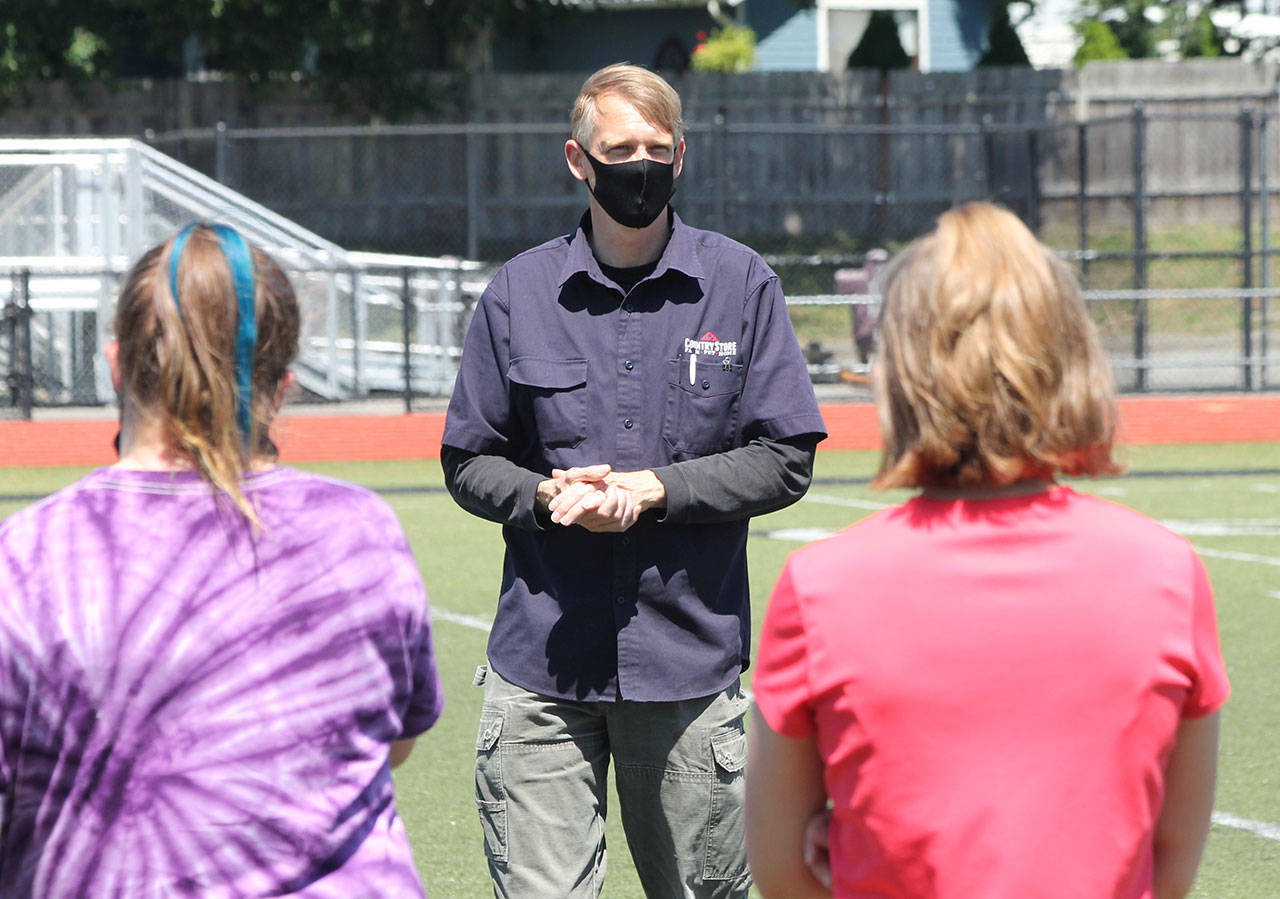Like so many things in today’s virus-ravaged world, the fate of Washington state high school fall sports is in limbo.
Many questions remain and some will be answered when the governing body for high school sports, the Washington Interscholastic Activities Association, announces its updated plans for fall athletics July 22.
Tuesday, July 7, the WIAA announced the beginning of fall sports will be delayed until Saturday, Sept. 5, for football and Monday, Sept. 7, for other sports.
Originally football was set to begin Aug. 19 with games starting Sept. 4.
The other fall sports — volleyball, cross country, girls soccer, boys tennis and girls swimming — were to begin practices on Aug. 24 and start games around Sept. 8.
Football players are required to complete 12 practices before they are eligible for game competition. The other sports require 10.
The delayed start will force schedule changes; schools now cannot begin competitions until Sept. 18.
The regular high school fall sports season isn’t the only activity sitting in the Twilight Zone. Athletes and coaches typically use the summer to prepare for the upcoming high school year, but the workout routines are anything but typical this offseason.
Whidbey Island’s three high school athletic directors, Coupeville’s Willie Smith, Oak Harbor’s Jerrod Fleury and South Whidbey’s Paul Lagerstedt, met this spring to develop a plan for summer workouts.
“We worked through the details together so all three island schools were following the same process,” Smith said. “We wanted to be on the same page; it was an awesome collaboration.”
When putting the plan together, the athletic directors followed guidelines from the National Federation of State High School Associations, the WIAA, Island County and the state.
A week later, the WIAA came out with its own guidelines, which were “basically the same,” Smith said.
Once Island County made the move into Phase 2, Smith shared the guidelines for athletes with Island Country health officials and received their blessing to begin workouts.
Coupeville began summer practices at that point.
South Whidbey athletes put in minimal work, Lagerstedt said, because the school’s facilities were still closed.
With all the restrictions, Oak Harbor players and coaches chose not to participate, according to Fleury.
When Island County was granted Phase 3 status, all three schools ramped up their offseason workouts.
Now that Oak Harbor is taking part, Fleury is happy with the participation considering the restrictions.
Ten of the school’s 19 sports are “holding practices,” Fleury said. “I am pleased with the teams taking advantage of the opportunity and the number of kids involved.”
In Phase 2, pods of only five players and one coach were allowed to work together. The group was required to stay together — no mixing of groups — for a week.
“It was pretty restrictive, but we were able to get the kids out and moving,” Smith said.
Phase 3 allows for more interaction, but has been a struggle for football, Smith said, because it is a contact sport.
All of those participating in offseason workouts, Lagerstedt said, are required to have their temperature taken and answer a list of questions when they arrive.
Those turning out indoors must wear masks, be in groups no larger than 10 and be in their own dedicated workout space.
Equipment is constantly sanitized, and the coaches are expected to disinfect any touch points after practice.
Outdoors, groups of 50 can turnout together, but they must be divided into pods of 10.
If kids can’t meet social distancing guidelines during drills, they must wear masks.
“If we don’t follow the rules, we will shut it down,” Fleury said.
If any of the athletes get to compete once and when the school year starts is anyone guess, Smith said.
It’s hard to make any definite plans, Lagerstedt added, because “things are changing week to week.”
“I do think we are going to play,” Fleury said, “but when and what it is going to look like is the question.”
“If we are not in Phase 4,” Smith said, “I don’t know how any sport besides cross country will go forward.”
“I understand the importance of athletics to the school and community, but we need to justify playing for the right reasons,” Smith said.
“The biggest concern is keeping the players, coaches and officials safe.”
Fleury added that there are two big questions: “One, Can we play and meet the requirements? and two, Can we allow people to watch?”
While health is the major concern of those involved, another problem is the bottom line of the schools’ athletic budgets.
“Not having any (football) game is pretty big,” Smith said.
“It’s a huge driver for our ASB — 50% (of our budget),” Lagerstedt said.
Fleury said football supplies 60% of Oak Harbor’s athletic budget.
Once the state gives the OK for schools and athletic seasons to begin, another question pops up: Who are the Whidbey Island schools going to play?
All of the surrounding counties which are home to Coupeville, Oak Harbor and South Whidbey’s conference opponents are still in Phase 2.
Counties must be in Phase 3 for contests to be played, and strict health guidelines must be followed. Also, only what the state calls “low risk” sports are eligible for competition in Phase 3.
Low risk sports include cross country (with staggered start), individual swimming, golf and track and field (running and throwing events).
In Phase 4, moderate risk sports will be allowed: basketball, volleyball, baseball, softball, soccer, tennis, swimming relays, 7-on-7 football and jumping events in track.
Volleyball, baseball, softball, tennis and the jumping events could be considered low risk with appropriate cleaning of equipment and use of masks by participants.
High risk sports are wrestling, football and competitive cheer that includes stunting.
So, will there be sports this school year?
“I hope there is something,” Fleury said. “Our kids need it; our community needs it.”



